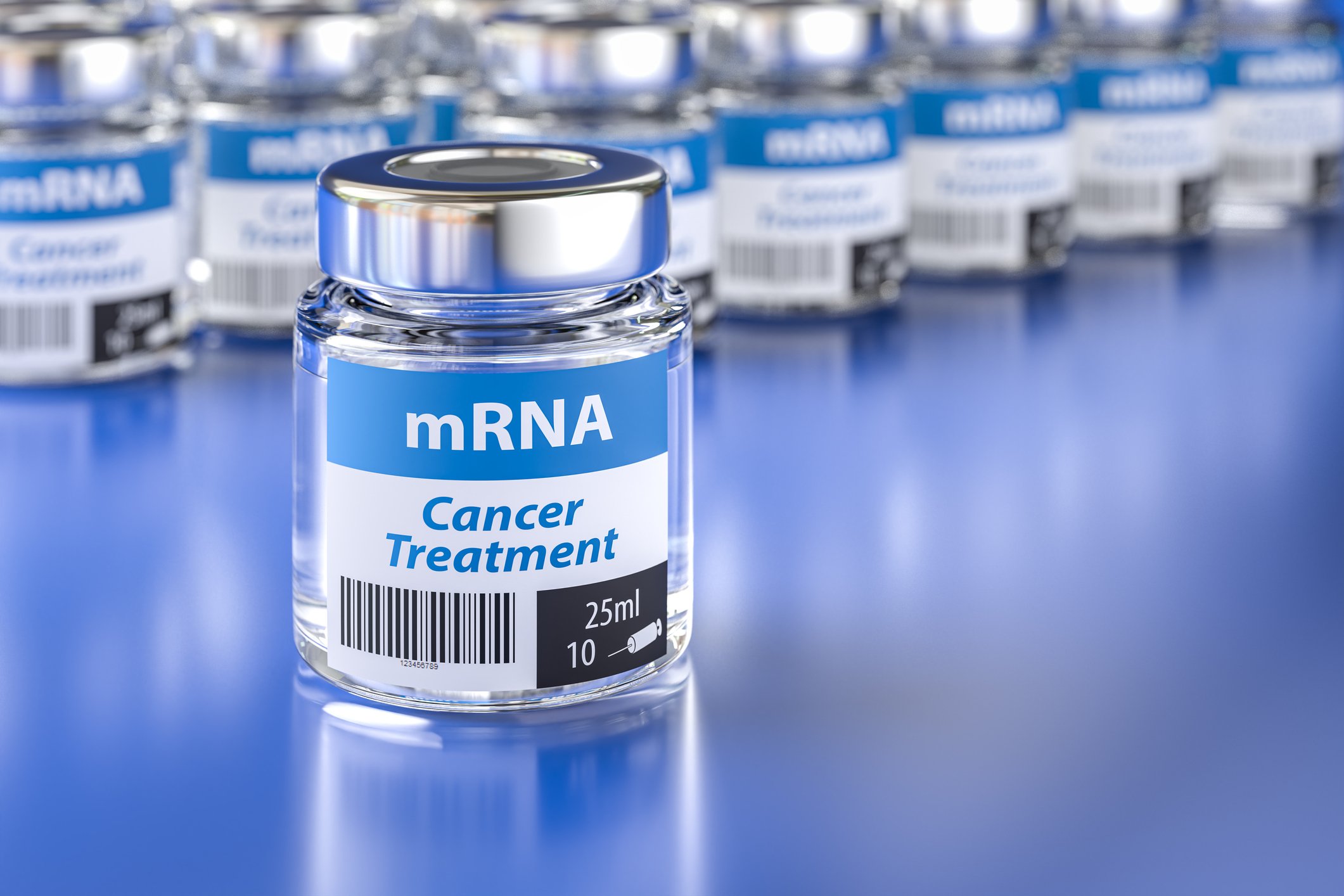The CDK4/6 inhibitor ribociclib (Kisqali®) for the treatment of HR+/HER2- metastatic breast cancer consistently showed a significant increase in OS (1-4). What does this mean for clinical practice? In a recent discussion between three Swiss breast cancer experts, Prof. Thomas Ruhstaller, Prof. Christian Kurzeder and Dr. Khalil Zaman, ribociclib distinguished itself as a therapy of first choice.
The introduction of cyclin-dependent kinase 4/6 inhibitors (CDK4/6i) has fundamentally changed the treatment landscape of patients with hormone receptor-positive (HR+), human epidermal growth factor receptor 2-negative (HER2-) metastatic breast cancer (5). Of the three CDK4/6i that are currently approved (abemaciclib, palbociclib, and ribociclib), ribociclib continues to show the most robust results for a wide range of patients as highlighted by the results of the phase III MONALEESA study program (2-4, 6). In MONALEESA-2 postmenopausal women in the ribociclib/letrozole group showed an overall survival (OS)-improvement of 12.5 months compared to the placebo/letrozole arm (2). Similar results were observed in combination with fulvestrant (MONALEESA-3), with a median OS-benefit of 12.2 months in the ribociclib/fulvestrant group compared to placebo/fulvestrant (3). Finally, in MONALEESA-7 with pre- or perimenopausal women the median OS was prolonged by 10.7 months in the ribociclib plus endocrine therapy arm compared with the placebo arm (4).
Benefit in first- and second-line therapy
How are these results to be evaluated for the clinical everyday life? Recently, three Swiss breast cancer experts met to discuss the relevance and use of CDK4/6i. Prof. Dr. med. Thomas Ruhstaller, Tumor- und Brustzentrum Ostschweiz/St.Gallen, highlighted the “impressive” OS-improvement with ribociclib in both the first- and second-line setting. Prof. Dr. med. Christian Kurzeder, University Hospital Basel, agreed: “The OS with ribociclib in the first-line setting as observed in MONALEESA-2 is really exciting because we have never seen such long survival data in HR+ metastatic patients before. The effect is consistent across many subgroups receiving different dose intensities. This is a major step forward in the treatment of HR+/HER2- metastatic breast cancer” (2). In contrast, surprisingly the final OS analysis of the phase III trial PALOMA-2 did not confirm a significant benefit for the palbociclib/letrozole combination (7). In this respect, it should always be considered that OS results may be much more complex to analyse compared to progression free survival (PFS) data, commented Dr. med. Khalil Zaman, Lausanne University Hospital (CHUV). The OS parameter is influenced by several factors, for example crossover phenomena, access to later line treatments or a big proportion of patients who are lost for follow-up, as was the case in PALOMA-2 (7). This is true, agreed Prof. Ruhstaller, and OS may not be the only argument for choosing one drug over the other. „But at the end of the day we follow the results of the studies. Since we have seen the MONALEESA-data we usually use ribociclib as first-line treatment.”
More quality of life
Prolonging life is an important goal of cancer therapy, but time gained should also be filled with a good quality of life (QoL). Prof. Ruhstaller experiences a huge heterogeneity between his patients in terms of side effects. “Ribociclib is often better tolerated compared to abemaciclib”, he noted (8). MONALEESA-7 showed a delayed deterioration of QoL and a later onset of several important symptoms like pain with ribociclib/letrozole compared to placebo/letrozole (9). „This is a huge gain for CDK4/6i therapy“, added Prof. Kurzeder. The experts agreed that the first weeks of therapy are crucial for its success and the compliance of the patients, a good tolerability is key in this respect. Overall, in terms of the clinical study data and their clinical experience the specialists’ verdict is unambiguous: „For the majority of patients, ribociclib is today the preferred option based on the available data on its efficacy and favorable tolerance profile”, summarized Dr. Zaman.
References
- Prescription Information for KISQALI®, as of August 2021. swissmedicinfo.ch
- Hortobagyi GN, et al., Overall Survival with Ribociclib plus Letrozole in Advanced Breast Cancer. N Engl J Med 2022; 386(10):942-950.
- Slamon DJ, et al., Ribociclib plus fulvestrant for postmenopausal women with hormone receptor-positive, human epidermal growth factor receptor 2-negative advanced breast cancer in the phase III randomized MONALEESA-3 trial: updated overall survival. Ann Oncol. 2021; 32(8):1015-1024.
- Lu YS, et al., Updated Overall Survival of Ribociclib plus Endocrine Therapy versus Endocrine Therapy Alone in Pre- and Perimenopausal Patients with HR+/HER2- Advanced Breast Cancer in MONALEESA-7: A Phase III Randomized Clinical Trial. Clin Cancer Res. 2022; 28(5): 851-859.
- Adon T, et al., CDK4/6 inhibitors: a brief overview and prospective research directions. RSC Adv. 2021 Sep 1;11(47):29227-29246. doi: 10.1039/d1ra03820f. PMID: 35479560; PMCID: PMC9040853.
- Nabieva N, Fasching PA. Endocrine Treatment for Breast Cancer Patients Revisited–History, Standard of Care, and Possibilities of Improvement. Cancers (Basel). 2021;13(22):5643.
- Finn RS et al: Overall survival (OS) with first-line palbociclib plus letrozole (PAL+LET) versus placebo plus letrozole (PBO+LET) in women with estrogen receptor–positive/human epidermal growth factor receptor 2–negative advanced breast cancer (ER+/HER2− ABC): Analyses from PALOMA-2. ASCO 2022; Abstract LBA1003.
- Rugo HS, et al. Quality of life (QOL) with ribociclib (RIB) plus aromatase inhibitor (AI) versus abemaciclib (ABE) plus AI as first-line (1L) treatment (tx) of hormone receptor-positive/human epidermal growth factor receptor– negative (HR+/HER2–) advanced breast cancer (ABC), assessed via matching-adjusted indirect comparison (MAIC). Presented at ASCO 2022, American Society of Clinical Oncology, Chicago, USA, 4–8 June 2022.
- Harbeck N et al: Health-related quality of life in premenopausal women with hormone-receptor-positive, HER2-negative advanced breast cancer treated with ribociclib plus endocrine therapy: results from a phase III randomized clinical trial (MONALEESA-7). Ther Adv Med Oncol. 2020 Jul 26;12:1758835920943065.
Novartis will provide the listed references upon request.
NO58523_01/2023
Kisqali® C: Film-coated tablets containing 200 mg ribociclib I: Kisqali is indicated in hormone receptor (HR)-positive, human epidermal growth factor receptor 2 (HER2)-negative (locally) advanced or metastatic breast cancer in combination: with an aromatase inhibitor as an initial endocrine therapy for the treatment of pre-, peri- or postmenopausal women; with fulvestrant as an initial endocrine therapy or following prior endocrine therapy for the treatment of postmenopausal women. In pre- or perimenopausal women the endocrine therapy should be combined with a luteinising hormone-releasing hormone (LHRH) agonist. D: The recommended dose of Kisqali is 600 mg (3 x 200 mg film-coated tablets) taken orally, once daily for 21 consecutive days followed by 7 days off treatment, resulting in a complete cycle of 28 days. When Kisqali is administered in combination with letrozole, the recommended dose of letrozole is 2.5 mg, taken once daily throughout the 28 day cycle. When Kisqali is administered in combination with fulvestrant, the recommended dose of fulvestrant is 500 mg administered intramuscularly on days 1, 15 and 29 and once monthly thereafter. In pre- or perimenopausal women an LHRH agonist should also be administered in accordance with local clinical practice when Kisqali is combined with an endocrine therapy. For dose adjustments refer to www.swissmedicinfo.ch. CI: Kisqali is contraindicated in patients with hypersensitivity to the active substance or to any of the excipients. PC: Neutropenia ADR: complete blood count before and during treatment. Dose interruption or reduction may be required. Hepatobiliary toxicity ADR: Liver function tests before and during treatment. Dose interruption or reduction may be required. QT interval prolongation ADR: ECG and monitoring of serum electrolytes before and during treatment. Kisqali is not recommended for use in combination with tamoxifen. Dose interruption or reduction may be required. Reproductive toxicity risk: contraception before, during, and after treatment. Severe skin reactions (TEN): If signs and symptoms appear that are suggestive of severe skin reactions, Kisqali must be immediately and permanently discontinued. Interstitial lung disease (ILD)/pneumonitis: Patients must be monitored for pulmonary symptoms indicative of ILD/pneumonitis. Treatment should be permanently discontinued, and then Kisqali can be resumed at the next lower dose level. For further details refer to www.swissmedicinfo.ch IA: Strong CYP3A4 inhibitor (e.g. clarithromycin, indinavir, itraconazole, ketoconazole, lopinavir, ritonavir, posaconazole, verapamil, voriconazole, grapefruits, grapefruit juice); strong CYP3A4 inducer (e.g. phenytoin, rifampicin, carbamazepine, St John’s Wort); CYP3A substrates with a narrow therapeutic index (e.g. midazolam, alfentanil, ciclosporin, dihydroergotamine, ergotamine, everolimus, fentanyl, sirolimus, tacrolimus); CYP1A2 substrate (caffeine); transporters P-gp, OAT1/3, OATP1B1/B3, OCT1, MATE2K, BCRP, OCT2, MATE1, human BSEP; medicinal products with potential to prolong the QT interval (e.g. chloroquine, halofantrine, clarithromycin, ciprofloxacin, levofloxacin, azithromycin, haloperidol, methadone, moxifloxacin, ondansetron, antiarrhythmics (e.g. amiodarone, sotalol)). For further details refer to www.swissmedicinfo.ch AE: Very common: infections, neutropenia, leukopenia, anaemia, decreased appetite, headache, dizziness, dyspnoea, cough, back pain, nausea, diarrhoea, vomiting, constipation, stomatitis, abdominal pain, abnormal liver function tests, alopecia, skin rash, pruritus, fatigue, peripheral oedema, asthenia, pyrexia • Common: lymphopenia, thrombocytopenia, febrile neutropenia, increased lacrimation, dry eye, hypocalcaemia, hypokalaemia, hypophosphataemia, vertigo, syncope, prolonged electrocardiogram QT interval, ILD/pneumonitis, dysgeusia, dyspepsia, hepatotoxicity, erythema, dry skin, vitiligo, increased blood creatinine, dry mouth, oropharyngeal pain. Frequency not known: Toxic epidermal necrolysis. For further details refer to www.swissmedicinfo.ch P: Film-coated tablets containing 200 mg ribociclib: Packs of 21, 42 or 63 tablets. Category A. For further information, see www.swissmedicinfo.ch. V09 August 2021. Novartis Pharma Schweiz AG, Risch; Address: Suurstoffi 14, 6343 Rotkreuz, Tel. 041/763 71 11
NO579090 08/2022










